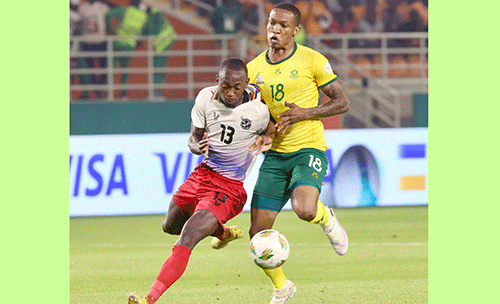Zebalt Ngaruka
Namibia’s football community is in a state of concern as the senior national team, the Brave Warriors, continues to struggle on the international stage.
With a series of disappointing losses, including failures to qualify for next year’s African Cup of Nations (Afcon) and a dramatic elimination from the African Championship (Chan) qualifiers, the country’s footballing future looks uncertain.
The Brave Warriors were recently knocked out by Lesotho in a penalty shootout during the Chan qualifiers in South Africa, a loss that has only intensified the worry surrounding the team’s current form.
As the national team’s woes mount, New Era Sport sat down with former Namibia Football Association (NFA) secretary general Barry Rukoro, who shared his thoughts on the team’s decline.
He offered a candid critique of the leadership at the NFA.
He has been at the helm of Namibian football administration in the past.
He expressed deep concern over the team’s inability to perform at the level that once saw them compete in major continental tournaments.
“The same team that once qualified for Afcon and other prestigious tournaments now seems to be struggling against teams they would have once easily beaten,” said Rukoro.
“So, what has changed?” he asked.
He said the blame for the current downturn does not fall solely on the players, but rather on the NFA leadership, which he believes has neglected the foundational work necessary to maintain a competitive national team.
He pointed out that despite the emergence of new players, these young talents are not receiving the same level of training, mentorship and resources that once set Namibia apart on the continental stage.
“There’s a gap in the system,” he noted.
“While we’re seeing new faces, they’re not being developed with the kind of discipline and focus that we had in previous years. Without a solid commitment to youth development, the future of Namibian football looks bleak,” he moaned.
His frustrations were fuelled by what he perceives as a misplaced emphasis on bureaucratic expansions at the NFA rather than grassroots development.
He noted the frequent announcements of new hires within the federation, but questioned how these positions translate into real benefits for players on the ground.
He warned that these administrative changes, if not directly aligned with player development, are diverting valuable resources away from where they are most needed.
These are youth academies and lower division clubs that nurture raw talent.
“We have more resources available now than ever before – thanks to Fifa’s increased funding for football development. But instead of focusing on nurturing young players, the NFA seems more focused on expanding staff,” Rukoro lamented.
“This is a critical time for the Brave Warriors – and without a strategic vision from the leadership, we risk losing a generation of football talent,” he remarked.
Rukoro emphasised that Namibia’s small player pool makes it even more important to implement a well-structured, targeted development programme.
He advocated for a system where emerging players are given consistent, high-level coaching and training, access to professional facilities, as well as regular competitive opportunities.
“The lower-division clubs, where most of our talent begins, are struggling with inadequate resources,” he said.
“We need a national framework that provides young athletes with access to elite coaching, fitness facilities and exposure to competitive play as early as possible. Without this, we’ll continue to fall behind,” he advised.
Rukoro stated that this systemic gap, especially in areas like strength training, nutrition and physical conditioning, can be easily addressed by ensuring that young players regularly train at dedicated football hubs, such as the Football House and Technical Centre, benefiting from structured programmes and expert guidance.
“The Brave Warriors’ success was built on a foundation of discipline, structure and commitment,” he said.
“We need to return to that model – investing in the future of our football through quality coaching, facilities and consistent competition. If we don’t act now, we risk seeing this era of football as the most ineffective in our history,” he stated.
Rukoro stressed that the time for action is now.
The resources and knowledge to turn things around are already available – the NFA leadership simply needs to refocus and prioritise player development over bureaucracy.
He warned that investing in high-level staff positions and salaries, while impressive on paper, means little if results are not visible on the pitch.
“Fans and stakeholders expect results,” he said.
“If we don’t take action, we’ll see the Brave Warriors’ legacy tarnished beyond repair,” he added.
– zngaruka@yahoo.com



